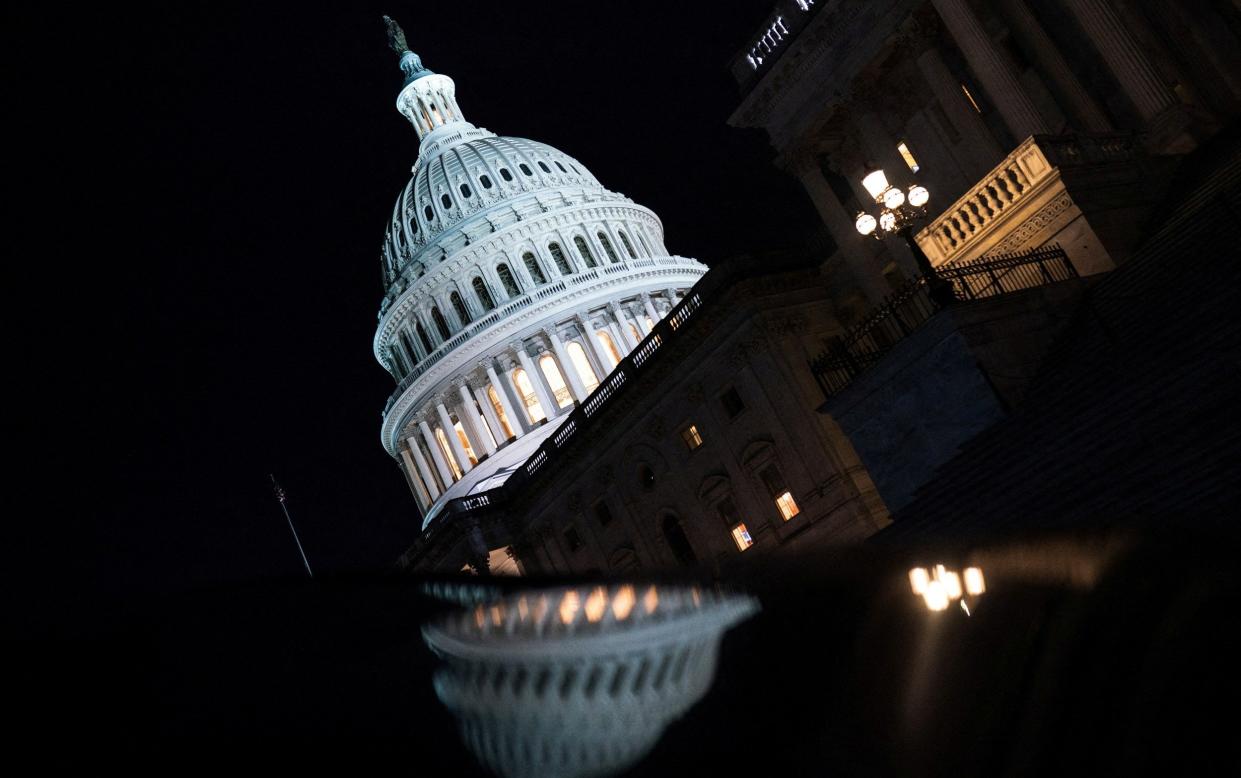When it comes to war and peace, the US is an elective dictatorship

- Oops!Something went wrong.Please try again later.
Ideally, the United States is supposed to be a constitutional republic, managed by a political system with three separate but co-equal branches of government that have distinct responsibilities. It’s messy and time-consuming more often than not; look no further than the ongoing debate in Washington about immigration or the countless cases gumming up the courts. Yet the process has worked relatively well for the US, and for all its blemishes is still upheld around the world as the prime example of good governance.
However, on matters of war and peace, the most important decision a state can make on behalf of its people, the US has been a de-facto monarchy for quite some time. The president has hogged all the power and expanded it to new domains, far beyond what the US Constitution expressly permits. And the legislative branch, by and large staffed with lawmakers who are unwilling to debate – let alone vote on – whether US military action in a particular country is in the US interest, is content with allowing the executive to do what it pleases.
It’s important to reiterate how the system is designed to work. Under the Constitution, Congress has the sole authority for declaring war, even as the president is commander-in-chief of the armed forces. Under the War Powers Resolution of 1973, passed by Congress over President Richard Nixon’s veto, the president can introduce US forces into hostilities under three scenarios: Congress declares war, Congress authorises military force through statute, or if “a national emergency created by attack upon the United States, its territories or possessions, or its armed forces” exists.
To ensure presidents don’t abuse the third scenario, they are required to submit a report to the House and Senate within 48 hours about why the US military was employed and, absent congressional authorization, must withdraw US forces within 60 days of submitting the report (although an additional 30-day extension is allowed).
The War Powers Resolution is the law of the land. But in reality, presidents often treat it as a nuisance and find sneaky ways around the statute. President Barack Obama’s Office of Legal Counsel, for instance, all but neutered the law in 2011, when they published an opinion arguing that Washington’s no-fly zone and bombing campaign in Libya didn’t constitute a “war” in the constitutional sense because no US ground forces were deployed. Sixteen years earlier, President Bill Clinton’s lawyers made the case that a proposed US troop deployment to Bosnia wouldn’t require congressional approval since the engagement itself was unlikely to result in sustained hostilities and wasn’t geared for conquest or occupation.
Of course, nowhere in the Constitution or the War Powers Act is “war” or “hostilities” defined in such an obtuse way. In fact, those terms are left undefined, perhaps because they are commonly understood to anybody with even a tertiary familiarity with the English language. Yet for better or worse (mostly worse), the executive branch’s shoddy interpretation is now cited as precedent for all US military engagements going forward. The president’s lawyers were able to rewrite the rules, giving their boss maximum flexibility to use US military force at a time and place of their choosing.
Biden isn’t the first American president to bypass Congress. The list is long and will only grow longer as the years go by. Ronald Reagan deployed US troops to Lebanon in 1982 to assist a UN-led peacekeeping mission there and ordered the invasion of Grenada in 1983, neither of which Congress authorised. President George H.W. Bush invaded Panama and sent US service members to Somalia without congressional approval.
Bill Clinton continued the Somalia deployment (until he pulled the plug in 1994 months after the Black Hawk Down disaster), bombed Iraq multiple times, bombed Serb forces in Bosnia in 1995 and spearheaded a 78-day NATO air war against Serbia to compel a withdrawal from Kosovo in 1999. Again, Congress approved none of this.
Donald Trump wasn’t exactly respectful of Congress’s prerogatives either. He took it upon himself to bomb Syrian government forces twice, in 2017 and 2018, to retaliate against Syrian dictator Bashar al-Assad for using chemical weapons on his own people. Whether or not those strikes were warranted as a policy matter can be debated; what can’t be debated was the fact that this was precisely the kind of executive war-making America’s founders sought to prevent.
James Madison had a lot of legendary lines in his career, but perhaps the most astute was this one: “In no part of the constitution is more wisdom to be found than in the clause which confides the question of war or peace to the legislature, and not to the executive department. Beside the objection to such a mixture of heterogeneous powers: the trust and the temptation would be too great for any one man.”
Regrettably, the US has gotten to the point where a single individual can determine whether the entire country moves onto a war-footing. Despite what the Biden administration may insist in public, the US is in effect fighting a war on multiple fronts, bombing dozens of militia targets in Iraq and Syria one day and launching airstrikes against Houthi military facilities the next. Meanwhile, the lawmakers who are actually responsible for deciding whether the US is at war are content with sitting things out, opining from the sidelines and tasking their staffers to write meaningless press releases in an attempt to convince their constituents that they’re doing their jobs.
They aren’t – and they should be called on the carpet for it.

